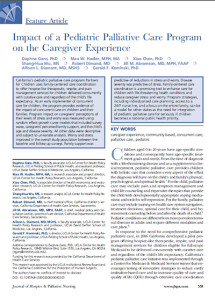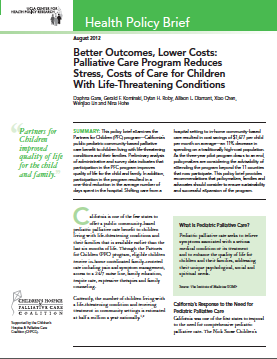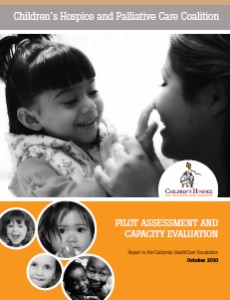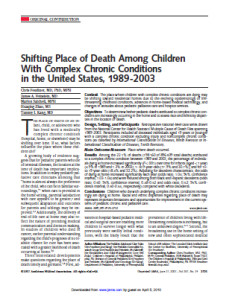The following research and whitepapers are based on our work in pediatric palliative care.

Impact Of A Pediatric Palliative Care Program On The Caregiver Experience
An article published in the December 2015 issue of the Journal of Hospice & Palliative Nursing shows that caregivers of children with serious illnesses also receive benefits from palliative care.
The article, Impact of a Pediatric Palliative Care Program on the Caregiver Experience, takes a look at the California pediatric palliative care waiver Partners for Children (PFC)—a Medi-Cal program currently available in nine California counties.
Download Impact of a Pediatric Palliative Care Program on the Caregiver Experience (PDF)
 Better Outcomes, Lower Costs: Palliative Care Program Reduces Stress, Costs Of Care For Children With Life-Threatening Conditions
Better Outcomes, Lower Costs: Palliative Care Program Reduces Stress, Costs Of Care For Children With Life-Threatening Conditions
This policy brief published by the UCLA Center for Health Policy Research examines the Partners for Children (PFC) program—California’s public pediatric community-based palliative care benefit to children living with life-threatening conditions and their families.
Preliminary analysis of administrative and survey data indicates that participation in the PFC program improves quality of life for the child and family. In addition, participation in the program resulted in a one-third reduction in the average number of days spent in the hospital. Shifting care from a hospital setting to in-home community-based care resulted in cost savings of $1,677 per child per month on average—an 11% decrease in spending on a traditionally high-cost population.
Download Better Outcomes, Lower Costs: Palliative Care Program Reduces Stress, Costs of Care for Children With Life-Threatening Conditions (PDF)
 Pilot Assessment And Capacity Evaluation (PACE)
Pilot Assessment And Capacity Evaluation (PACE)
The Pilot Assessment and Capacity Evaluation (PACE) study by the Children’s Hospice & Palliative Care Coalition (CHPCC) represents a milestone in statewide efforts to implement the pediatric palliative care benefit through Medi-Cal.
Completed by CHPCC in 2010, the study reviews the landscape for pediatric home health and hospice programs in California. It also gauges the potential for additional healthcare providers to offer services to seriously ill children.
Download the PACE study (PDF)
 Shifting Place Of Death
Shifting Place Of Death
This study, published in JAMA, shows that seriously-ill children would rather be at home than anywhere else.
“The place of death of an infant, child, or adolescent who has lived with a medically complex chronic condition (hospital, home, or elsewhere) may be shifting over time. If so, what factors influence the place where these children die?
“A growing body of evidence suggests that for pediatric patients who die of terminal illnesses, the location at the time of death has important implications. In addition to many pediatric palliative care clinicians attesting that “home is almost always the preference of the child, who can be in familiar surroundings,” when care is provided in the home setting, parental satisfaction with care appears to be greater, and subsequent adaptation and outcomes for parents and siblings may be improved…” Read more (PDF)
Know of other research relevant to pediatric palliative care? Share it by contacting us.